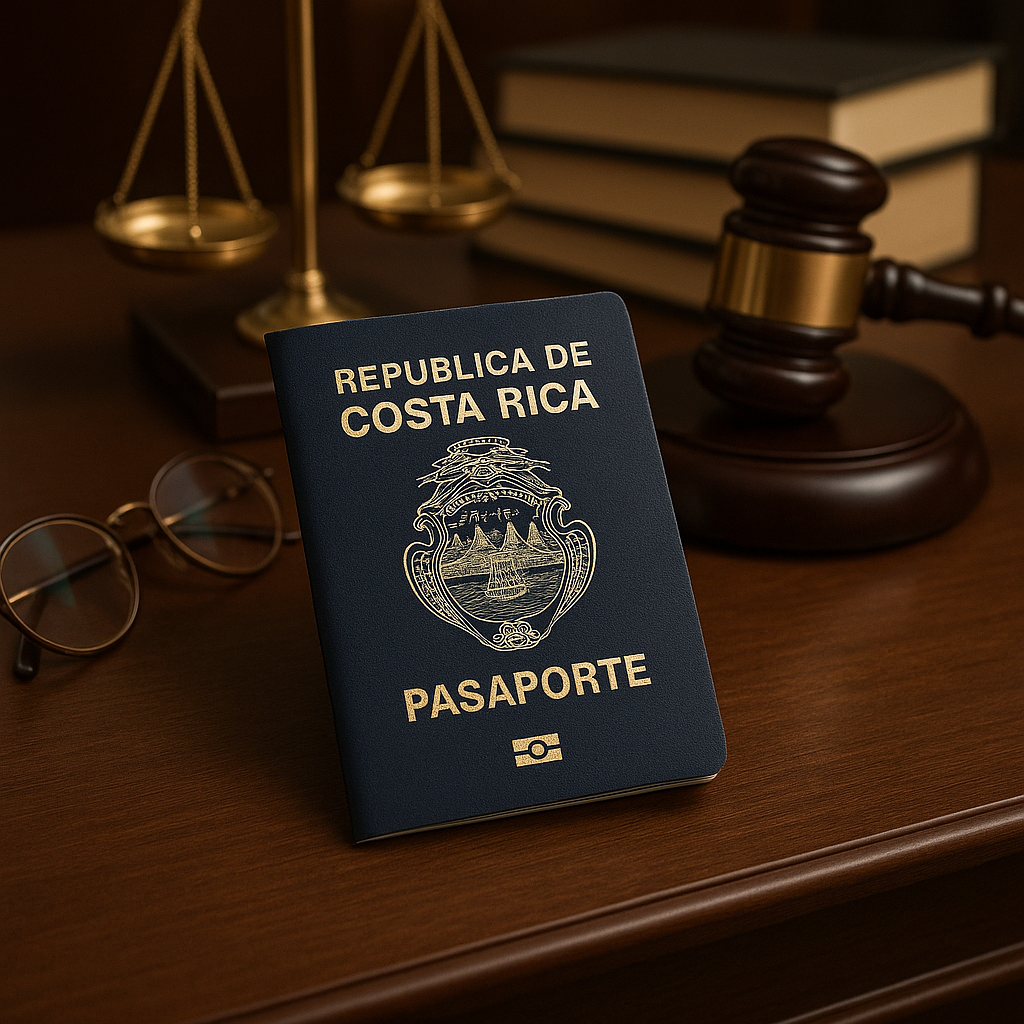Costa Rica: Passport vs Permanent Residency ID Explained


Over 1,000 expats move to Costa Rica annually, drawn by its lush rainforests, vibrant culture, and welcoming environment. For those seeking a better quality of life or new opportunities, understanding the legal pathways to residency is crucial.
We will explore the key differences between obtaining citizenship and securing permanent residency status with its corresponding identification document. This guide aims to simplify the complexities of Costa Rica's immigration landscape, providing clear explanations to help you make an informed decision.
By distinguishing between these two distinct immigration pathways, we will help you navigate the sometimes complex process and choose the path that best aligns with your long-term plans for living in this beautiful Central American country.
Understanding Costa Rica's Immigration Options
For those looking to relocate, Costa Rica offers a range of immigration pathways tailored to different needs. The country's diverse options cater to various circumstances, making it an attractive destination for expatriates.
The Appeal of Costa Rica for Expatriates
Costa Rica's unique blend of natural beauty, cultural richness, and modern amenities makes it a highly appealing destination for expatriates. The country's stable economy, friendly locals, and relatively straightforward immigration process contribute to its attractiveness.
Many are drawn to Costa Rica's rentista residency option, designed for individuals with a stable income from abroad, while others opt for investment residency, which requires contributing to the country's development through business investment.
Overview of Available Immigration Pathways
Costa Rica offers several distinct immigration pathways, including tourist visas, temporary residency, permanent residency, and citizenship. Temporary residency categories cater to retirees, investors, rentistas, and those with family ties to Costa Ricans.
Permanent residency becomes available after maintaining temporary residency for a specific period, typically three years, offering more rights and fewer restrictions. Citizenship requires additional time as a resident and meeting specific requirements, including language proficiency and cultural knowledge.
Costa Rica Passport vs Permanent Residency ID: Key Differences
The decision to obtain a Costa Rica passport or a Permanent Residency ID depends on several factors, including legal status and document validity. We will explore these differences to help you make an informed decision.
Legal Status and Rights Comparison
When comparing the legal status and rights associated with a Costa Rica passport and a Permanent Residency ID, several distinctions become apparent. A Permanent Residency ID, also known as a DIMEX card, is issued to foreign nationals who have been granted permanent residency in Costa Rica. This document is crucial for accessing various services within the country. On the other hand, a Costa Rica passport is issued to citizens and provides not only the right to live in Costa Rica but also facilitates international travel. For more information on the DIMEX card, you can visit https://www.jaroscr.com/dimex-costa-rica/.
While both documents serve as official identification, the rights and privileges they confer differ significantly. Permanent residents with a DIMEX card have the right to work, access healthcare, and own property in Costa Rica, but they do not have the right to vote in national elections. In contrast, Costa Rican citizens with a passport enjoy full rights, including voting privileges and the ability to hold public office.
Document Validity and Renewal Requirements
The validity and renewal requirements for a DIMEX card and a Costa Rica passport also vary. A DIMEX card is typically valid for two years and requires renewal, involving paperwork and fees. The renewal process necessitates proof of continued residency in Costa Rica. In contrast, a Costa Rica passport is usually valid for 10 years. Once citizenship is established, the renewal process for a passport is generally simpler.
Understanding these differences is essential for planning long-term stays in Costa Rica and managing important document timelines. Both documents are vital for different reasons, and being aware of their respective validity periods and renewal requirements can help individuals avoid potential issues.
The Permanent Residency Path
For those considering making Costa Rica their home, navigating the Permanent Residency Path is a crucial step. This path is designed for foreign nationals who wish to reside in Costa Rica long-term. The process involves several key components, including understanding the different types of residency categories available and the role of the DIMEX card in daily life.
Types of Residency Categories
Costa Rica offers various residency categories to accommodate different needs and circumstances. These categories determine the initial requirements and ongoing obligations for foreign residents. The categories include, but are not limited to, pensionado, rentista, and inversionista, each with its own set of eligibility criteria. Understanding these categories is essential for selecting the most appropriate path for your situation.
For instance, pensionados are retirees who receive a pension from a qualified source. Rentistas, on the other hand, are individuals with a guaranteed income from a reliable source outside of Costa Rica. Inversionistas are those who invest in the country, contributing to its economic growth.
The DIMEX Card Explained
The DIMEX (Documento de Identidad Migratorio para Extranjeros) card is a critical document for foreign residents in Costa Rica. It serves as official identification and proof of legal residency status. The DIMEX card contains personal information, a photograph, signature, and a unique identification number, making it an essential tool for daily transactions and interactions.
With a DIMEX card, residents can access various services, including opening a bank account, signing contracts, and registering for utilities. For permanent residents, the DIMEX card typically requires renewal every two years. Understanding how to obtain and maintain a valid DIMEX card is vital for a smooth living experience in Costa Rica.
The Path to Costa Rican Citizenship and Passport
Becoming a Costa Rican citizen is a meaningful way to deepen your connection with the country. This significant step not only enhances your legal status but also enriches your overall experience living in Costa Rica. Citizenship offers a range of benefits that can significantly impact various aspects of your life.
Citizenship Requirements and Application Process
To become a Costa Rican citizen, one must first meet specific eligibility criteria, which typically include a minimum period of residency, proficiency in Spanish, and knowledge of Costa Rican culture and history. The application process involves submitting required documents, passing a background check, and demonstrating financial stability. It's also necessary to show a genuine connection to the country, which can be evidenced through family ties, investments, or other significant links.
Once the application is submitted, it undergoes review, and applicants may be required to attend an interview. The process can be lengthy, so it's essential to be patient and thorough in preparing the necessary documentation.
Benefits of Having a Costa Rican Passport
A Costa Rican passport provides numerous advantages, including visa-free or visa-on-arrival access to approximately 150 countries and territories, making international travel significantly easier. As a citizen, you gain full political rights, including the ability to vote and run for public office, allowing for complete civic participation. Additionally, Costa Rican citizenship is lifelong and can be passed down to children, creating a lasting legacy. Citizens can work in any field without restrictions, and having a Costa Rican passport offers a sense of permanent belonging and security.
Comparing Application Processes
Navigating the complexities of Costa Rica's immigration system involves understanding the distinct application processes for permanent residency and citizenship. Both pathways have their own set of requirements and timelines, which are crucial for individuals planning to make Costa Rica their home.
Permanent Residency Application Timeline and Requirements
The process for obtaining permanent residency in Costa Rica involves several steps, including submitting the required documents and waiting for the application to be processed. Applicants must provide comprehensive documentation, including proof of income, health insurance, and background checks.
The timeline for permanent residency can vary, but it generally takes several months to a year or more to complete the process. It's essential for applicants to ensure they meet all the requirements and submit a complete application to avoid delays.
Citizenship and Passport Application Timeline and Requirements
In contrast, the citizenship application process in Costa Rica typically takes 10-12 months from submission to approval. Applicants must pass written exams in Spanish and Social Studies, demonstrating their proficiency in the language and knowledge of the country's culture and history.
Once citizenship is granted, the passport application is a separate process that requires additional documentation and fees. This process usually takes 1-2 months to complete. It's worth noting that citizenship applications are processed by the Supreme Elections Tribunal, which is a different government department from the one handling residency applications.
Practical Benefits and Limitations
As we explore the nuances of living in Costa Rica, understanding the practical implications of permanent residency versus citizenship is crucial. Both options offer unique advantages, but they also come with certain limitations that can significantly impact one's lifestyle and opportunities.
What You Can Do with Permanent Residency
Permanent residency in Costa Rica provides a stable status for foreigners, allowing them to live and work in the country without the need for frequent renewals. However, it does not grant the same level of civic participation as citizenship. Residents can own property, access public healthcare, and work in most professions, but they are restricted from certain government positions and may face limitations in other areas.
For instance, permanent residents are required to renew their DIMEX card periodically, and they must comply with specific requirements to maintain their status. While this status offers a degree of stability, it is not as secure as citizenship, which is permanent and not subject to renewal.
What You Can Do with Costa Rican Citizenship
Costa Rican citizenship, on the other hand, offers full political rights, including the power to vote and run for public office, thereby allowing complete civic participation. A Costa Rican passport provides visa-free or visa-on-arrival access to approximately 150 countries and territories, significantly enhancing international mobility. Citizens can also hold dual citizenship, maintaining their original nationality while enjoying the benefits of being Costa Rican.
Furthermore, Costa Rican citizenship is permanent and cannot be revoked except in rare cases of fraud, providing lifetime security regardless of how much time is spent outside the country. Citizens can also work in restricted professions that may not be available to residents, including certain government positions and professional fields with citizenship requirements.
Financial Considerations
As you weigh the options between permanent residency and citizenship in Costa Rica, the financial implications of each path become a critical factor. Understanding these costs is essential for making an informed decision about your future in this beautiful country.
Costs Associated with Permanent Residency
Permanent residency in Costa Rica involves various expenses, including application fees, document preparation, and potentially, legal assistance. The initial application process can be costly, with fees varying depending on the type of residency category you apply under. For detailed information on whether residency in Costa Rica is worth the investment, you can visit this resource.
Additionally, applicants must consider the costs of obtaining required documents, such as apostilled birth certificates and proof of income.
Costs Associated with Citizenship and Passport
The citizenship application process in Costa Rica, while having minimal government fees, involves several other expenses. Applicants must budget for document preparation, including apostille services for foreign documents like birth certificates. The citizenship process also requires investment in Spanish language and civics exam preparation.
After citizenship is granted, there's a separate application process for a Costa Rican passport, which has its own fees, currently ranging from $70 to $100, plus the cost of passport photos.
Making the Right Choice for Your Situation
The decision between pursuing permanent residency and citizenship in Costa Rica depends on individual circumstances. We must consider our long-term goals, financial situation, and personal preferences when deciding which path is most suitable.
Permanent Residency Considerations
Permanent residency in Costa Rica is ideal for those who wish to maintain their current nationality while still enjoying the benefits of living in Costa Rica. This status is suitable for individuals who do not plan to stay in the country indefinitely or who are not ready to commit to the responsibilities that come with citizenship. For instance, if you're unsure about your long-term plans or prefer to keep your options open regarding international travel with your current passport, permanent residency might be the more sensible choice.
Citizenship Advantages
On the other hand, pursuing Costa Rican citizenship offers numerous advantages, particularly for those who have established strong ties with the country. Citizenship provides the right to vote, a Costa Rican passport that allows visa-free travel to approximately 150 countries, and a deeper sense of belonging. We find that individuals with long-term family connections in Costa Rica, or those who have lived in the country for many years and are fluent in Spanish, often benefit significantly from obtaining citizenship.
Conclusion
In summary, understanding the differences between Costa Rican citizenship and permanent residency is crucial for making an informed decision. We've explored the key distinctions between obtaining a Costa Rican passport through citizenship and maintaining permanent residency status with a DIMEX card, highlighting the unique advantages and limitations of each path.
The choice between pursuing permanent residency or citizenship in Costa Rica depends on your personal circumstances, long-term goals, and how deeply you wish to integrate into Costa Rican society. Permanent residency offers flexibility for those who want to live in Costa Rica while maintaining their original citizenship. On the other hand, citizenship provides additional benefits, including political rights and visa-free travel to more countries.
For personalized guidance on Costa Rica residency and citizenship options, you can contact Jaros CR at info@jaroscr.com, +(506) 71828969, or visit https://www.jaroscr.com. If you're concerned about maintaining your residency status, you may find more information on losing your Costa Rican DIMEX.


